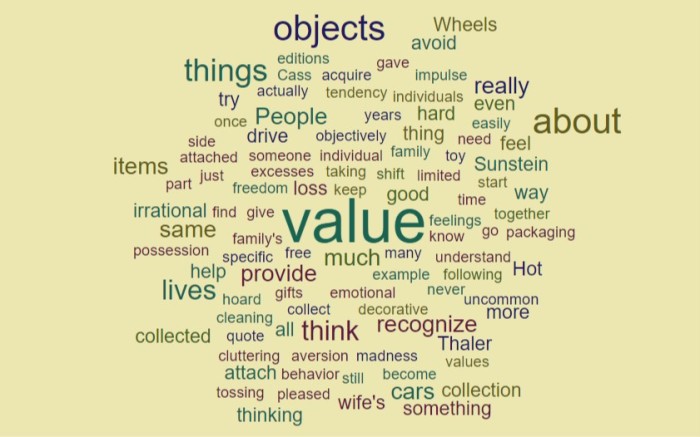My dad collected Hot Wheels toy cars. He had thousands of cars, all in their packaging, with limited editions and rare valuable cars all collected and organized together. It was a hobby, and an example of how much value an individual can attach to objects that don’t mean anything to other people.
On my wife’s side of the family, near-hoarding behavior is not uncommon. With my dad’s collection and my wife’s family’s saving everything just in case, we have both seen the excesses of placing too much value in objects. We try hard to think critically about the things we have in our lives, and try to avoid having too many things and giving them too much value. But still, it is hard to part with things, even when they are gifts that we never really wanted and even when we know that we don’t need it or could replace it easily.
In the book Nudge, Cass Sunstein and Richard Thaler write the following about the value of objects. “People do not assign specific values to objects. When they have to give something up, they are hurt more than they are pleased if they acquire the very same thing.”
People are not actually that good at thinking about value. We will go out of our way for free stuff, we will hoard things to avoid feelings of loss, and we will collect items that don’t have the same economic value as the emotional value we attach to them once they are in our possession. This impulse helps drive our economy, but it can also drive us as individuals into madness.
I think that it is important to understand the quote from Sunstein and Thaler. When we recognize that we are not very good at thinking about value objectively, we can recognize irrational ways that we become attached to mere objects. We can start to shift the way we think about the material things in our lives and to really consider if they provide us value. We might find that our Hot Wheels collection really does provide us value, but at the same time, we may recognize that the decorative thing that someone gave us years ago doesn’t provide value. We can look at items that sit around taking up space, requiring cleaning, and cluttering our lives and feel more freedom with parting from those items. Understanding our irrational tendency towards objects and value can help us rethink what we keep, what we fill our lives with, and can help us get beyond the loss aversion we feel when we think about selling something or tossing it out.





